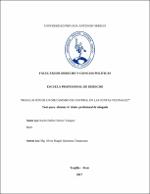Regulación de un mecanismo de control en las juntas vecinales

View/
Download
(application/pdf: 1.185Mb)
(application/pdf: 1.185Mb)
Date
2017Author(s)
Chavez Vasquez, Karen Dalila
Metadata
Show full item recordAbstract
El presente trabajo de investigación, tiene como finalidad dar a conocer la importancia del
derecho de participación, mediante la formación de las juntas vecinales. Asimismo describiremos
las funciones y competencias que ejercen dichas juntas.
También daremos a conocer en el presente trabajo la importancia económica que ejerce cada
municipalidad y el respaldo de la Ley N° 27972 mediante el patrimonio municipal que cada
órgano local debe de administrar y cuidar; y según la normatividad vigente, las municipalidades
son las únicas que se encargan de realizar cobros (tributos) mediante su función recaudadora.
No obstante, en la realidad existe una problemática, respecto a la mala práctica de funciones que
realizan las juntas vecinales, toda vez que en ciertas ocasiones se extralimitan en su competencia;
y de esta manera vulneran los derechos fundamentales de las personas como el de transitar
libremente en los espacios púbicos, así como de disfrutar el bien público y gozar de ellos,
restringiendo dichos derechos y realizando perjuicios económicos; ya que dichas juntas efectúan
cobros ilegales a los ciudadanos para que puedan acceder a un espacio público. Sabemos que el
Estado brinda dichos espacios o bienes públicos para que cada ciudadano goce y disfrute
libremente del bien. Al respecto, sabemos que la Municipalidad Provincial de Trujillo tiene
conocimiento de los actos abusivos que realizan algunas juntas vecinales en el distrito, sin
embargo hasta la fecha no se han tomado acciones y/o medidas para frenar la mala práctica de
estas organizaciones sociales.
Es por ello, que en el presente trabajo de investigación sugerimos un mecanismo de control,
mediante una propuesta legislativa, con el fin de imponer sanciones a aquellos que
aprovechándose del cargo vecinal que ostentan, realizan actos abusivos y de esta forma otorgar
protección a los ciudadanos que se perjudican por el mal actuar de estas personas. The purpose of this research is to inform the importance of the right of participation, through the
formation of the neighborhood meetings. We will also describe the functions and powers
exercised by said boards.
We will also present in this paper the economic importance of each municipality and the support
of Law No. 27972 through the municipal heritage that each local body must administer and care;
And according to current regulations, the municipalities are the only ones responsible for
collecting (taxes) through its collection function.
However, in reality there is a problem, regarding the malpractice of functions performed by the
neighborhood meetings, since at times they exceed their competence; And in this way violate the
fundamental rights of people such as free movement in pubic spaces, as well as enjoy the public
good and enjoy them, restricting those rights and doing economic damage, As these boards
illegally charge citizens so they can access a public space. We know that the State provides such
spaces or public goods so that each citizen enjoys and freely enjoys the good. In this regard, we
know that the Provincial Municipality of Trujillo is aware of the abusive acts carried out by some
neighborhood councils in the district. However, to date, no actions and / or measures have been
taken to curb the malpractice of these social organizations.
It is for this reason that in the present investigation we suggest a mechanism of control, through a
legislative proposal, in order to impose sanctions on those who, taking advantage of the local
office that they carry out, perform abusive acts and in this way grant protection to the citizens
That are harmed by the bad acting of these people.
Subject
Collections
- Derecho [481]

